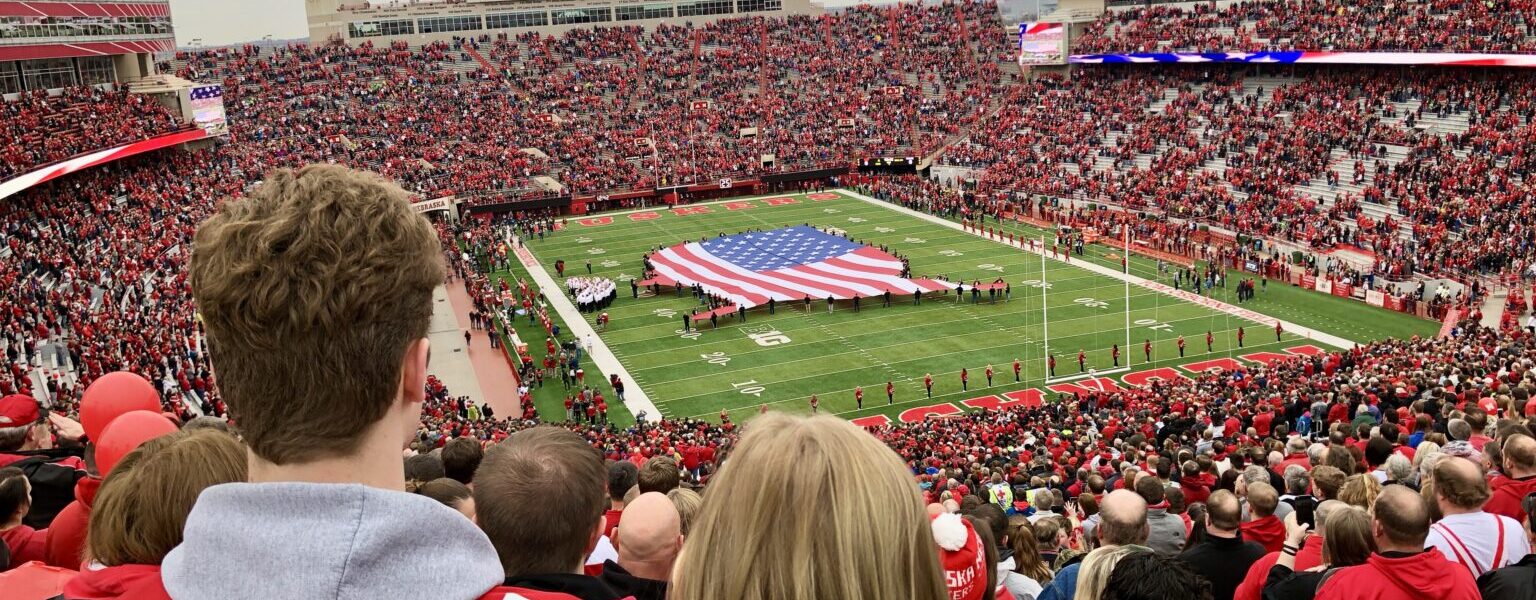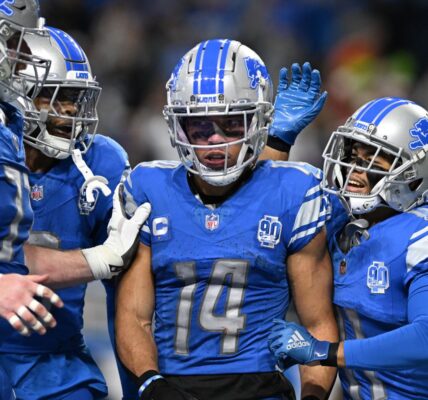Lincoln — Recent initiatives to gather money from the private sector for a new NU football stadium and to compensate players are its offering plate, if Nebraska football is the state religion.
The pewsitters are still giving. East of the stadium is a $165 million indoor facility that is still under development, mostly thanks to donations. History indicates that they will keep giving.
However, some Husker supporters and state politicians are opposing NU Athletics Director Trev Alberts’ most recent quest to raise $450 million to restore Memorial Stadium, a Big Red rarity.
According to Alberts, renovations are necessary at the stadium to ensure that NU supporters can enjoy it for another 100 years. South Stadium would be replaced as part of the proposed renovations, enhancing the concessions, bathrooms, and seating for fans.
According to NU authorities, a large portion of the building must comply with federal regulations regarding accessibility for patrons with disabilities. It’s also said that upkeep of the stadium’s sound system calls for some repair.
Timing-related queries
However, a few ardent supporters of Husker football and the University of Nebraska privately have doubts about Alberts’ strategy and timing in pursuing a significant new football stadium proposal.

Over the next two years, the University of Nebraska-Lincoln and the NU system are expected to experience a $58 million financial deficit. Campuses are suggesting staff layoffs and reductions to academic offerings.
The University of Nebraska Foundation is now engaged in a $3 billion capital drive to support NU’s future academic growth and reputation.
Football at NU is likewise rebuilding. In order to guarantee the program’s first bowl bid since 2016, first-year coach Matt Rhule must defeat Iowa in the season’s last game on Black Friday.
Brutal visuals
The building of the stadium may very well be necessary, according to Bayard state senator Steve Erdman, who is a member of the Appropriations Committee, which drafts the state budget. But Alberts ought to have waited for Rhule to secure more victories, he claimed.
A number of benefactors who wished to remain anonymous expressed disapproval of the way athletics is currently requesting so much money. Even though the athletics department contributes millions to the academic side and sustains itself, they claimed it runs the danger of undermining taxpayer funding for NU.
A few contributors said NU exacerbated the situation by augmenting Alberts’ perks and tripling his pay to $1.7 million this month, following rumors from insiders that he was being pursued by another employer. In 2026, his salary will soar to $2.1 million.
According to some local advocates, Alberts runs the danger of creating donor fatigue among megadonors who have diverse objectives and among those who want to see results before the next appeal.
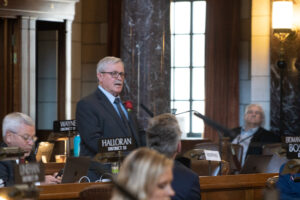
During the board meeting in October, Barbara Weitz, a NU Regent from Omaha whose family has contributed funds to the university in the past, expressed some of this uncertainty.
“Why at this time?” Alberts was asked by Weitz. “I understand the significance of Husker athletics, but the amount of money we anticipate raising from many of the same individuals worries me greatly.”
College athletics is rapidly evolving.
Alberts stated in a Wednesday interview that the stadium project will support NU athletics in strengthening its financial position while it awaits the resolution of many legal matters that may lead to revenue-sharing with athletes.
He questioned whether NCAA rules are anti-competitive, whether student-athletes should be paid, whether college athletes can bargain collectively, and whether amateur athletes should share in the millions of dollars in television rights that they help schools generate. He brought up lawsuits against the NCAA and more.
According to one complaint, athletes should get 50% of the average earnings from ticket sales, corporate sponsorships, and broadcast revenue from Power Five schools. According to Alberts, he informs donors that for a university like Nebraska, this may include figuring out how to replace as much as $40 million in revenue annually.
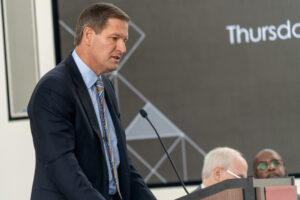
According to Alberts, a large chunk of the money will go to the players. So, the issue is: How is Nebraska going to handle that? “The strongest balance sheet wins” in that cosmos, he claimed.
Furthermore, he claimed, Nebraska will be debt-free.
Numerous colleges are deciding whether to play collegiate football at the highest level, adjusting to TV network influence, conference realignment, and player compensation for name, image, and likeness.
“It evolved into, ‘We have to work very hard at developing a business plan to replace the lost revenue that will ultimately go directly to student-athletes.'”
intimidating extent
Alberts acknowledged that some individuals may find the “size and scope and the challenge of the project” unsettling. He informed the board during the October Regents meeting that his plans may be adjusted based on the amount of money donated.
According to him, his objectives are to ensure that Nebraska has the means to compete, to maintain the department’s autonomy, and to provide strong support for non-revenue sports and women’s sports.
He stated, “We will cut the cloth to fit the quilt.” “We will adjust our strategy and the overall scope of our project if any of our anticipated sources (of financing) either don’t show up or don’t live up to our promises.”
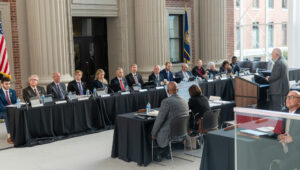
Jim Scheer of Norfolk, Kathy Wilmot of Beaver City, and Elizabeth O’Connor of Omaha, the NU Regents, expressed their gratitude to Alberts for recognizing the necessity of financial off-ramps.
Sports should raise the money, according to Scheer, as they have “every time that I’m aware of.” However, he acknowledged that “a lot of people are unsure” due to the unpredictability of the economy.
Wilmot informed Alberts that she did not want to become involved in anything that would ultimately end up costing the institution and its students. According to O’Connor, she would have appreciated clearer standards and timeframes for fundraising.
During the discussion, Tim Clare, the chairman of the Regents, acknowledged his colleagues’ inquiries but remarked, “At the University of Nebraska, excellence counts.”
He described NU athletics as a major component of “our brand.”
He said that it draws students and possible contributors. Husker supporters also deserve “the best fan experience in the country,” considering that every home football game since the 1960s has been sold out.
Concerns over the fundraising agreement
The board ultimately decided to back the stadium project, voting in favor of paying an outside contractor up to $5.5 million in order to generate a minimum of $225 million by the end of 2025.
The Nebraska Philanthropic Trust, which is well-known for its connections to Omaha’s most generous contributors, agreed to pay the fundraiser a monthly fee ranging from $137,500 to $275,000 until 2025.
Additionally, it holds NU athletics accountable for any expenses related to fund-raising. That covers lodging, food, and entertainment. All spending must have department approval.
The Nebraska Examiner was contacted by a number of contributors who characterized the deal as strange. According to them, the majority of contracts directly link salary to fundraising success.

Just 10% of the 341 schools and universities polled in a 2022 study on funding tuition reductions by the National Association of College and University Business Officers stated they paid a fundraising agency a fee whether or not the effort was successful.
One booster questioned, “Where are the financial incentives linked to performance and timing?” “What prevents them from dragging out the fundraising process to ensure they receive the full amount?”
Questions were directed to Alberts by Sue Morris, the director of the Nebraska Philanthropic Trust.
University upholds the agreement
According to NU officials, there is a clear financial incentive in the contract: NU has the option to cancel the agreement with 30 days’ notice. In addition, even when the organization reaches the $5.5 million contract threshold at the end of 2025, it must continue to generate money until at least $250 million is raised.
According to NU spokesperson Melissa Lee, the Board of Regents, Alberts, and the future NU president will closely monitor the status of fundraising efforts. NU will not begin construction until the necessary funds are raised.

Having built Baxter Arena and Maverick Park with the University of Nebraska in Omaha, Alberts expressed confidence in the fundraising firm and methodology.
Alberts stated that criticism is a part of the work. He added that large-scale fundraising initiatives usually face resistance in the early going. He claimed he is not shocked by the opposition from donors.
According to Alberts, fundraising is not a choice between the university’s academic and sports departments. He stated that Nebraskans will back both.
Referring to Nebraska Philanthropic Trust as a “valuable and trusted partner,” he said the organization will help manage the project and generate cash in order to keep it on schedule and within budget.
According to him, the team will collaborate with the university and the athletics department to come up with innovative methods for funding athletics and academic initiatives in order to fill newly available space at the stadium.
“My experience plays a part in this,” Alberts remarked. We were succeeded in finishing a few really difficult assignments. These are really difficult tasks to do. To be honest, I thought we needed this skill.
Results and memo for UNO
Alberts pushed for new facilities for baseball, softball, basketball, volleyball, hockey, and basketball in order to assist UNO enter the more expensive and competitive Division I sports scene.
In baseball, softball, and men’s and women’s soccer, UNO has recently won conference titles. Alberts’ supporters assert that both men’s basketball and Husker football are making progress.
After Alberts departed for UNL, UNO administrators questioned his financial management of the UNO athletics department, according to an internal document obtained by Flatwater Free Press on November 1.

According to the UNO document, Baxter Arena need additional state and federal assistance to help pay for operational costs. On Wednesday, he declined to talk about the memo.
Numerous regents declined to comment on this issue when contacted by phone or message.
In his quest to succeed NU President Ted Carter, who is leaving in January to take the helm of The Ohio State University, Clare has stated that he is doing fewer interviews.
Shortly before he announced his resignation, Carter, who had taken over management of NU athletics from the regents, gave Alberts his increase.
